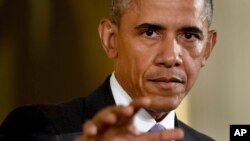U.S. President Barack Obama staunchly defended the historic deal restraining Tehran's nuclear development program Wednesday, saying it represented the world's best "means of ensuring Iran does not get a nuclear weapon."
The American leader said at a White House news conference that the pact "cuts off every single path" for Iran to build an atomic bomb. He declared the deal will make the United States, its allies and the world "safer and more secure."
He said if the U.S., through the congressional review process, misses the chance to approve the deal, "history will judge us harshly." He said another opportunity to complete a deal with Iran "may not come in our lifetime."
Mr. Obama said the U.S.-led negotiations with Iran were "a powerful display of American leadership."
Mr. Obama faces wide opposition to deal from Republican lawmakers and Republican presidential contenders seeking to replace him in 2017 when his eight-year presidential tenure ends, and he is prohibited by the U.S. Constitution from seeking a third term in office.
Earlier, Vice President Joe Biden headed to Congress for a closed-door meeting to brief the minority Democrats in the House of Representatives about the pact with Tehran.
One lawmaker quoted Biden as saying that "nothing in this agreement takes the military option off the table" for an attack against Iran if it violates the deal and starts building a nuclear weapon. Another said the vice president contended that "the entire sanctions regime" that has been imposed against Iran to pressure it to complete a deal "would crumble" if the pact negotiated by the United States and five other world powers is not implemented.
Once Congress is handed the formal agreement, it has 60 days to consider whether to reject it, and even it does, Mr. Obama has promised to veto such legislation. If that were to happen, both houses of Congress would then have to produce a two-thirds majority to override the president's veto.
One vocal Republican opponent of the deal, Senator John McCain, who lost the 2008 presidential election to Mr. Obama, acknowledged to VOA that it "is likely" that the deal will eventually be approved.
Opponents of the agreement continued their barrage of attacks Wednesday. One leading Republican presidential contender, real estate mogul Donald Trump, called it a "disgrace," while another candidate, Senator Lindsey Graham, said it was "a terrible idea."
Many Republicans and some Democrats in Congress, as well as leaders such as Israeli Prime Minister Benjamin Netanyahu, disagree with President Obama's assessment of the deal. Mr. Obama contends it will cut off all pathways Iran has to develop a nuclear weapon.
In an interview with The New York Times, Mr. Obama said the agreement achieves the basic goal that even critics agree with that Iran should not have a nuclear weapon.
"This is our best option to make sure that not just for the first 10 years, but for years afterwards, we have a verifiable inspection regime that ensures they do not obtain a nuclear weapon," Mr. Obama said. "That is worth an enormous amount in terms of our national security, and Israel's national security and our other allies' national security in the region. It also prevents the possibility of a nuclear arms race in the region."
Mr. Obama said whoever is president 10 or 15 years from now will have the same ability to use military action or to impose new sanctions, but with the agreement his successors also will have more insight into Iran's nuclear program and "international legitimacy" to act against any violations.
He also mentioned the need to work with Israel and Persian Gulf allies to guard against the possibility of Iran using money unlocked by sanctions to sponsor terrorism.
On Tuesday, the president discussed the Iran deal with various allies in the Middle East, including Saudi Arabia's King Salman and Crown Prince Mohammed Al Nahyan of the United Arab Emirates. The White House said Mr. Obama recalled a summit earlier this year with Persian Gulf nations, and reiterated that the U.S. remains committed to working with them to counter Iran's destabilizing activities in the region.
Kerry calls it a 'good deal'
U.S. Secretary of State John Kerry, who spearhead efforts by the so-called P5+1 group of the U.S., Britain, China, France, Russia and Germany, called the accord a "good deal."
It will limit Iran's potential development of nuclear weapons while allowing the country to maintain a civilian atomic program, dramatically scaling back the number of Tehran's advanced centrifuges by two-thirds, according to senior U.S. administration officials.
Iranian Foreign Minister Mohammed Javad Zarif spoke of the deal as a new diplomatic beginning for the countries involved, calling it "not a ceiling but a solid foundation. We must now begin to build on it," he posted on Twitter.
The economically crippling economic sanctions that have been in force against Iran and Tehran's strained diplomatic relations with the U.S. and the Western countries involved in the talks at times threatened to thwart the Vienna talks.
One contentious point access by monitors to Iran's nuclear sites was ultimately addressed with the creation of a mechanism that will allow the U.N. to push for entry, but that gives Iran the right to challenge the request through arbitration.
The deal also addresses U.N. embargoes on conventional weapons, which Iran backed by Russia - sought to remove. It upholds the arms ban for five more years and the missile ban for eight, but could end earlier if the IAEA determines Iran complied with the terms of the nuclear deal, which includes dismantling any current work toward nuclear weapons a charge Tehran has repeatedly denied.
In exchange, the major powers agreed to lift the economic sanctions against Iran, in part by unfreezing billions of dollars in assets abroad as soon as Tehran complies with the requirements of the nuclear agreement.
Obama Staunchly Defends Iran Nuclear Accord




